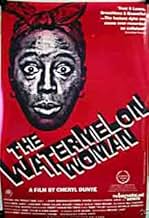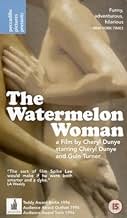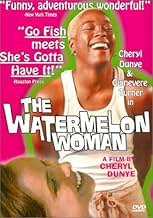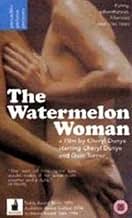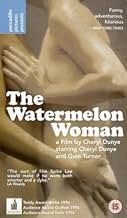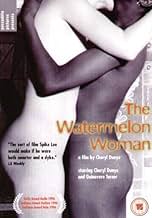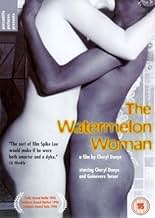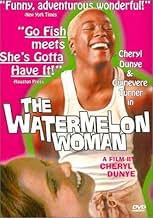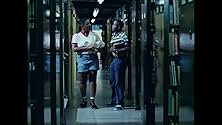IMDb-BEWERTUNG
7,1/10
4029
IHRE BEWERTUNG
Eine junge schwarze lesbische Filmemacherin erforscht das Leben von The Watermelon Woman, einer schwarzen Schauspielerin aus den 1930er Jahren, die den Archetypus der "Mammy" spielte.Eine junge schwarze lesbische Filmemacherin erforscht das Leben von The Watermelon Woman, einer schwarzen Schauspielerin aus den 1930er Jahren, die den Archetypus der "Mammy" spielte.Eine junge schwarze lesbische Filmemacherin erforscht das Leben von The Watermelon Woman, einer schwarzen Schauspielerin aus den 1930er Jahren, die den Archetypus der "Mammy" spielte.
- Auszeichnungen
- 4 wins total
Cheryl Clarke
- June Walker
- (as Cheryl Clark)
Kat L Robertson
- Yvette
- (as a different name)
Handlung
WUSSTEST DU SCHON:
- WissenswertesAccording to writer/director Cheryl Dunye, much about the character she plays in the film is autobiographical, but the historical references to the Watermelon Woman are fictional: "The Watermelon Woman came from the real lack of any information about the lesbian and film history of African-American women. Since it wasn't happening, I invented it."
- PatzerCheryl (Cheryl Dunye) appears to make a slight fluff of her lines during a dinner scene with Diana, Tamara and Stacey, saying: "Anyway, Diana, if you came to Philadelphia to shape... escape the cold Chicago winters..."
However, as the dinner conversation is deliberately uncomfortable, this is possibly intended.
- Crazy CreditsThe film, which seems to be a documentary about Cheryl's search for the obscure actress who inspired her, ends with these printed words: "Sometimes you have to create your own history. The Watermelon Woman is fiction. Cheryl Dunye, 1996"
- Alternative VersionenIn 2016, director Cheryl Dunye's landmark Black Queer Film THE WATERMELON WOMAN was re-released in select theaters and festivals with a pristine 2K HD restoration overseen by the production company 13th Gen, in partnership with Modern Videofilm. The restoration and re-release was sponsored by First Run Features, the Outfest UCLA Legacy Project, and the Toronto International Film Festival. This theatrical tour will be followed by a DVD re-release in early 2017.
- VerbindungenFeatured in Fabulous! The Story of Queer Cinema (2006)
Ausgewählte Rezension
A cause for celebration, this 20th Anniversary DVD release. The Watermelon Woman was a revelation back in 1996 and it is -- shame on us -- perhaps even more to-the-point today.
Seated by myself at the Film Forum here in NYC, 1996, a gay non-Black guy, I was expecting a variation on the Melvin Van Peebles satire from the early seventies, The Watermelon Man. But a mere five minutes into The Watermelon Woman, I knew I was in the presence of something special, indeed. Here was a tsunami of vivid, fresh air.
Cheryl Dunye -- writer, director, star -- had created something utterly new. Here she was, placing a Black Lesbian at the center, unapologetic about her same-sex longing and needs, about her rich magnetic Blackness, her fierce yet tender femaleness. For me, used to seeing Lesbians or gay men like myself held up for mockery or derision or contempt, it was a revelation to see Lesbians portrayed as just part of the human tapestry, regular people making it through the day, paying bills, falling in and out of lust and love.
For that alone, The Watermelon Woman deserves high praise. But it is about so much more. For Ms. Dunye uses her Blackness to probe an America which has never come to terms with its deep racist history. Ms. Dunye confronts it with wit and candor. Her character is researching a beautiful Black actress from the 1930s, who never received a credit in her films. It's like she never existed, a mere celluloid presence, nothing more.
As she probes deeper into the actress's past, Ms. Dunye begins peeling away her own reality. As both a Lesbian and a Black woman, in an America which marginalizes Lesbians, Blacks, women. She is forced to question assumptions about what it means to be a Lesbian and both a woman and a woman of color.
And here is where The Watermelon Woman becomes as timely as it was back in 1996. For in confronting her own marginalization, Ms. Dunye makes crystal clear why today's Black Lives Matter is so important to today's America. Like any work of art -- and make no mistake, The Watermelon Woman is a work of art, indeed -- meanings change over time. And though Black Lives Matter hadn't yet become a rallying cry, its genesis is inherent in The Watermelon Woman.
Cheryl Dunye, you and The Watermelon Woman are a oner!
Seated by myself at the Film Forum here in NYC, 1996, a gay non-Black guy, I was expecting a variation on the Melvin Van Peebles satire from the early seventies, The Watermelon Man. But a mere five minutes into The Watermelon Woman, I knew I was in the presence of something special, indeed. Here was a tsunami of vivid, fresh air.
Cheryl Dunye -- writer, director, star -- had created something utterly new. Here she was, placing a Black Lesbian at the center, unapologetic about her same-sex longing and needs, about her rich magnetic Blackness, her fierce yet tender femaleness. For me, used to seeing Lesbians or gay men like myself held up for mockery or derision or contempt, it was a revelation to see Lesbians portrayed as just part of the human tapestry, regular people making it through the day, paying bills, falling in and out of lust and love.
For that alone, The Watermelon Woman deserves high praise. But it is about so much more. For Ms. Dunye uses her Blackness to probe an America which has never come to terms with its deep racist history. Ms. Dunye confronts it with wit and candor. Her character is researching a beautiful Black actress from the 1930s, who never received a credit in her films. It's like she never existed, a mere celluloid presence, nothing more.
As she probes deeper into the actress's past, Ms. Dunye begins peeling away her own reality. As both a Lesbian and a Black woman, in an America which marginalizes Lesbians, Blacks, women. She is forced to question assumptions about what it means to be a Lesbian and both a woman and a woman of color.
And here is where The Watermelon Woman becomes as timely as it was back in 1996. For in confronting her own marginalization, Ms. Dunye makes crystal clear why today's Black Lives Matter is so important to today's America. Like any work of art -- and make no mistake, The Watermelon Woman is a work of art, indeed -- meanings change over time. And though Black Lives Matter hadn't yet become a rallying cry, its genesis is inherent in The Watermelon Woman.
Cheryl Dunye, you and The Watermelon Woman are a oner!
Top-Auswahl
Melde dich zum Bewerten an und greife auf die Watchlist für personalisierte Empfehlungen zu.
- How long is The Watermelon Woman?Powered by Alexa
Details
Box Office
- Budget
- 300.000 $ (geschätzt)
- Bruttoertrag in den USA und Kanada
- 1.989 $
- Eröffnungswochenende in den USA und in Kanada
- 774 $
- 13. Nov. 2016
- Weltweiter Bruttoertrag
- 1.989 $
- Laufzeit1 Stunde 25 Minuten
- Farbe
Zu dieser Seite beitragen
Bearbeitung vorschlagen oder fehlenden Inhalt hinzufügen

Oberste Lücke
By what name was The Watermelon Woman (1996) officially released in India in English?
Antwort



